Madurkathi Mats
Filters
-
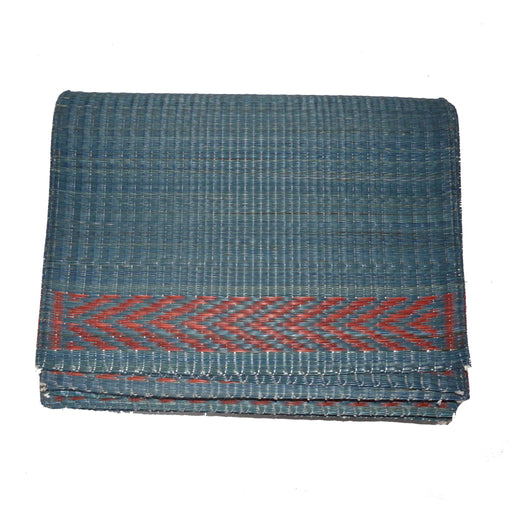
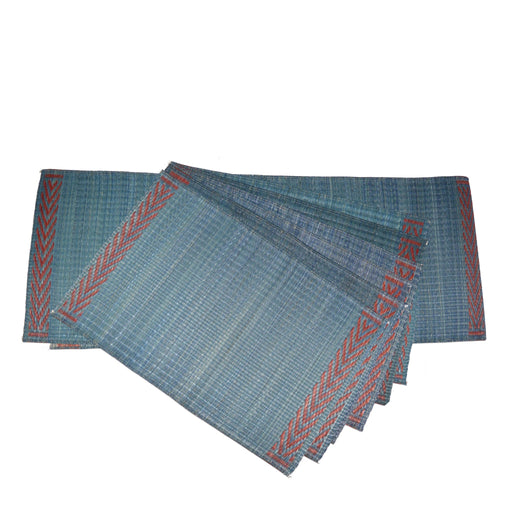 Original price ₹4,075.00 - Original price ₹4,075.00Original price ₹4,075.00₹4,175.00₹4,175.00 - ₹4,175.00Current price ₹4,175.00| /
Original price ₹4,075.00 - Original price ₹4,075.00Original price ₹4,075.00₹4,175.00₹4,175.00 - ₹4,175.00Current price ₹4,175.00| /Indigo and Red Handwoven Masland Table Mat and Runner Set
Ashok Jana
Made to order. Making time: 10 daysNo reviewsA hint of red travels across the placid surface of an indigo sea. An approaching storm or the setting sun. Only the artisan weaving the tale knows ...
View full detailsOriginal price ₹4,075.00 - Original price ₹4,075.00Original price ₹4,075.00₹4,175.00₹4,175.00 - ₹4,175.00Current price ₹4,175.00| / -
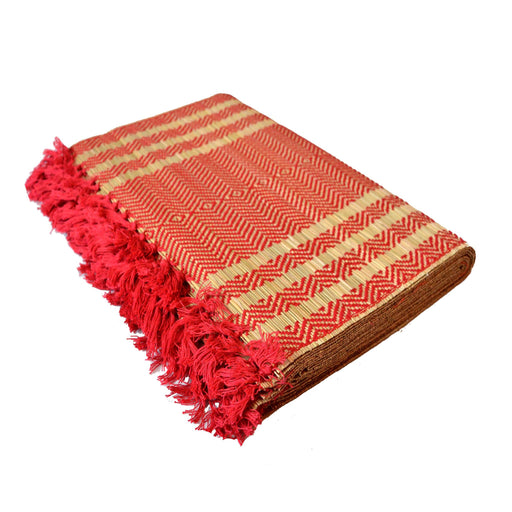
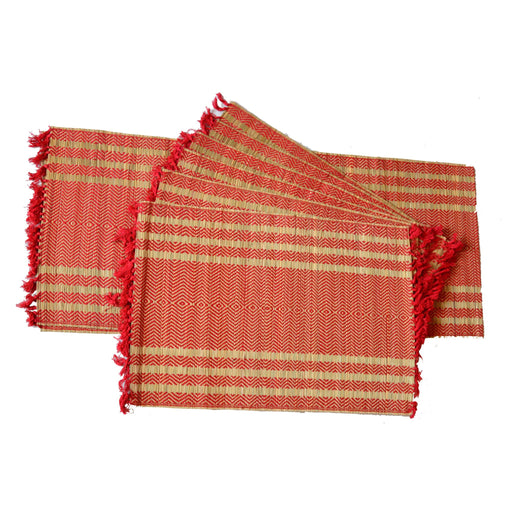 Original price ₹905.00 - Original price ₹905.00Original price ₹905.00₹985.00₹985.00 - ₹985.00Current price ₹985.00| /
Original price ₹905.00 - Original price ₹905.00Original price ₹905.00₹985.00₹985.00 - ₹985.00Current price ₹985.00| /Red and Beige Handwoven Madurkathi Table Mat and Runner Set
Ashok Jana
Made to order. Making time: 10 daysNo reviewsA cool, tropical sunset, lazily takes a last bow on a fibre stage, while the audience, all dressed in beige, patiently wait for the grand finale. A...
View full detailsOriginal price ₹905.00 - Original price ₹905.00Original price ₹905.00₹985.00₹985.00 - ₹985.00Current price ₹985.00| / -
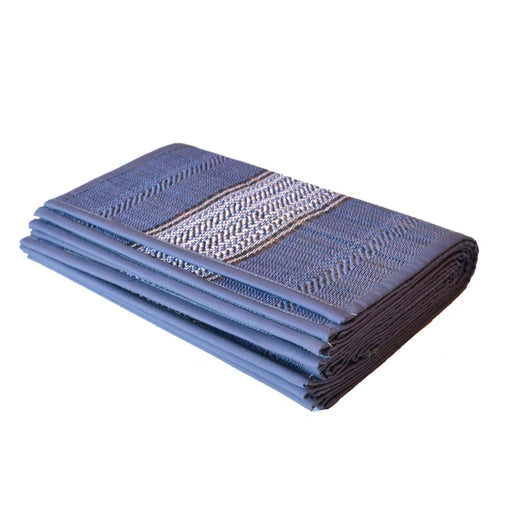
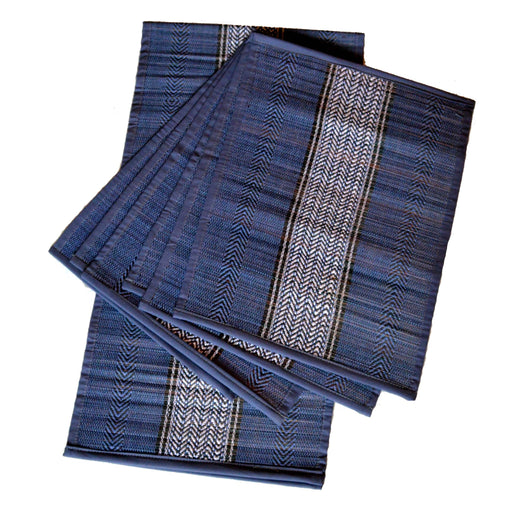 Original price ₹725.00 - Original price ₹725.00Original price ₹725.00₹805.00₹805.00 - ₹805.00Current price ₹805.00| /
Original price ₹725.00 - Original price ₹725.00Original price ₹725.00₹805.00₹805.00 - ₹805.00Current price ₹805.00| /Blue and White Handwoven Madurkathi Table Mat and Runner Set
Ashok Jana
Made to order. Making time: 10 daysNo reviewsAzure waters, infinite in depth and wisdom, make room for white hot sands. Maintaining a fine balance, but never flippant about their beauty. Perha...
View full detailsOriginal price ₹725.00 - Original price ₹725.00Original price ₹725.00₹805.00₹805.00 - ₹805.00Current price ₹805.00| / -
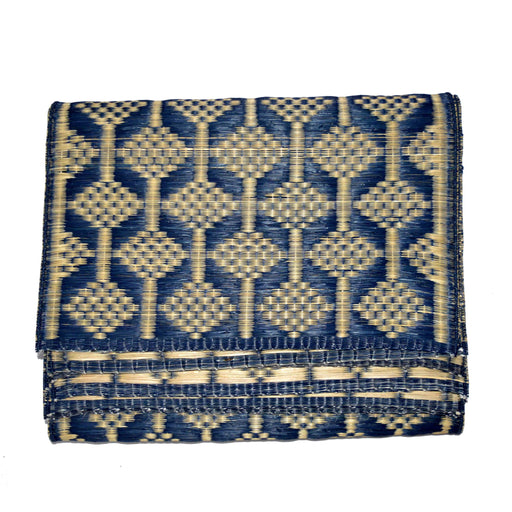
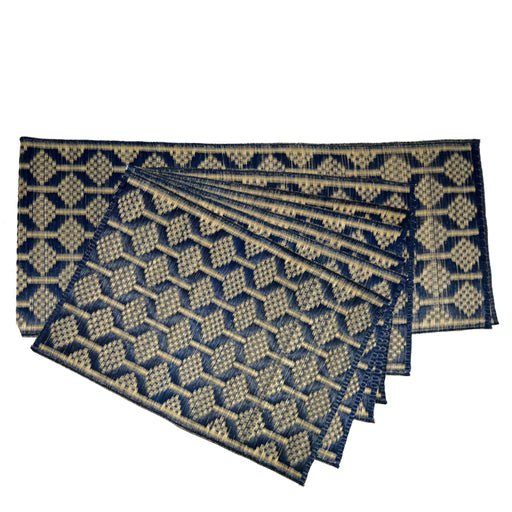 Original price ₹4,075.00 - Original price ₹4,075.00Original price ₹4,075.00₹4,175.00₹4,175.00 - ₹4,175.00Current price ₹4,175.00| /
Original price ₹4,075.00 - Original price ₹4,075.00Original price ₹4,075.00₹4,175.00₹4,175.00 - ₹4,175.00Current price ₹4,175.00| /Blue and Beige Handwoven Masland Table Mat and Runner Set
Ashok Jana
Made to order. Making time: 10 daysNo reviewsA blue sky peeks from behind the clouds and silently witnesses the proceedings from within the depths of handmade mats. Reminiscent of a river mirr...
View full detailsOriginal price ₹4,075.00 - Original price ₹4,075.00Original price ₹4,075.00₹4,175.00₹4,175.00 - ₹4,175.00Current price ₹4,175.00| / -
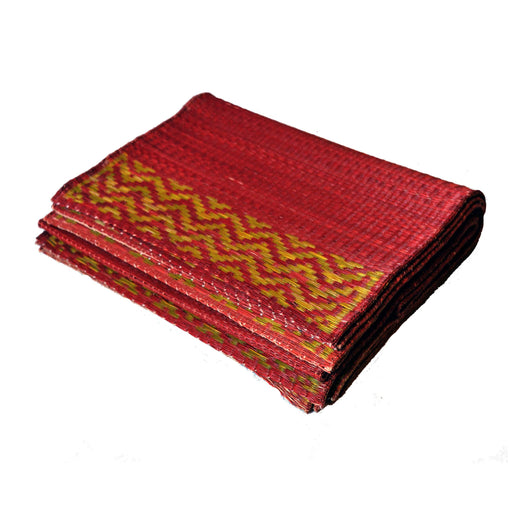
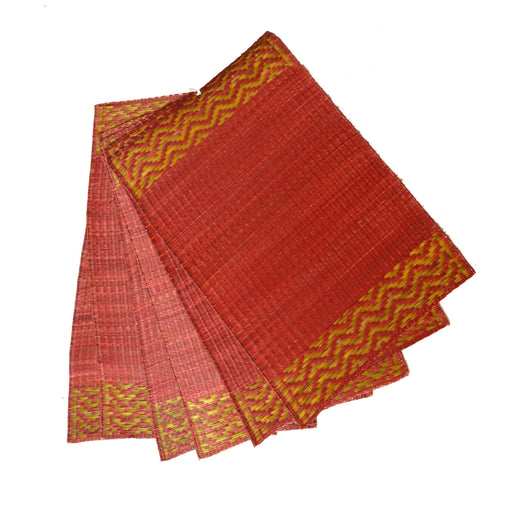 Original price ₹4,075.00 - Original price ₹4,075.00Original price ₹4,075.00₹4,175.00₹4,175.00 - ₹4,175.00Current price ₹4,175.00| /
Original price ₹4,075.00 - Original price ₹4,075.00Original price ₹4,075.00₹4,175.00₹4,175.00 - ₹4,175.00Current price ₹4,175.00| /Red and Mustard Handwoven Masland Table Mat and Runner Set
Ashok Jana
Made to order. Making time: 10 daysNo reviewsRed sands stretch endlessly across handmade Masland Madurkathi table mats and a singular runner, their solemnity unabashedly broken by mustard wave...
View full detailsOriginal price ₹4,075.00 - Original price ₹4,075.00Original price ₹4,075.00₹4,175.00₹4,175.00 - ₹4,175.00Current price ₹4,175.00| / -
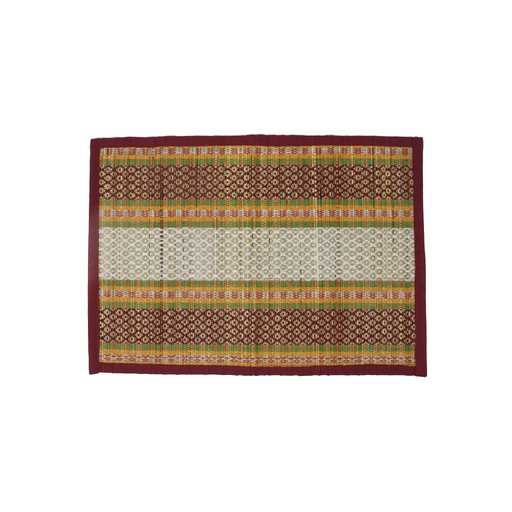
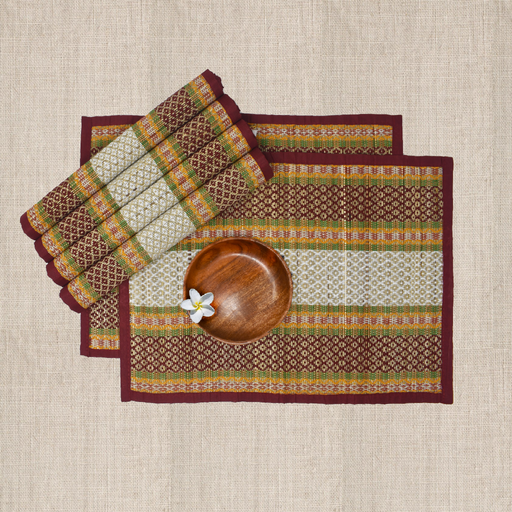 Original price ₹265.00 - Original price ₹415.00Original price ₹265.00₹325.00 - ₹475.00₹325.00 - ₹475.00Current price ₹325.00| /
Original price ₹265.00 - Original price ₹415.00Original price ₹265.00₹325.00 - ₹475.00₹325.00 - ₹475.00Current price ₹325.00| /Maroon, White and Beige Handwoven Madurkathi Table Mats (Set of 6)
Ashok Jana
Made to order. Making time: 10 daysNo reviewsA heritage craft, products of which were collected as tax in the early 18th century. These sustainable and eco-friendly pieces which can be folded,...
View full detailsOriginal price ₹265.00 - Original price ₹415.00Original price ₹265.00₹325.00 - ₹475.00₹325.00 - ₹475.00Current price ₹325.00| / -
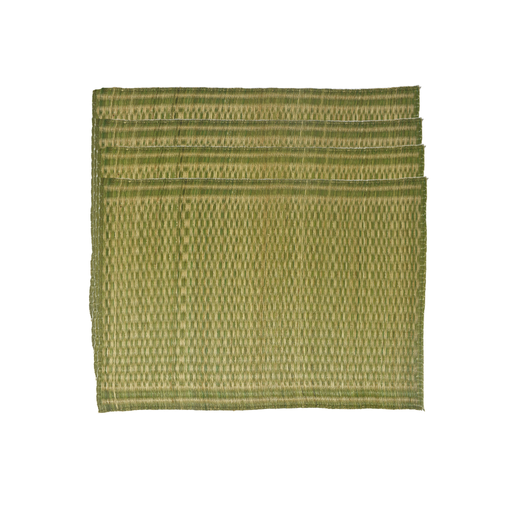
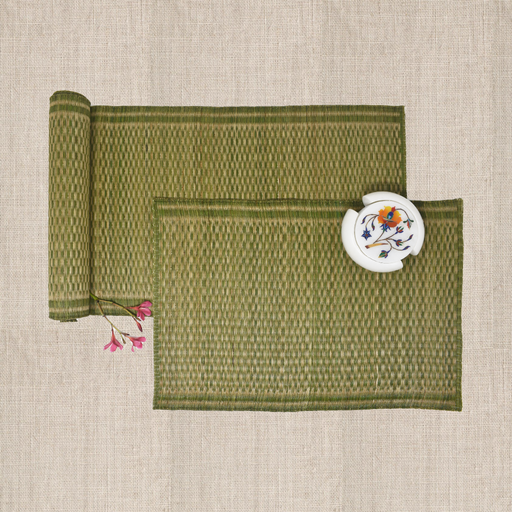 Original price ₹3,170.00 - Original price ₹3,170.00Original price ₹3,170.00₹3,270.00₹3,270.00 - ₹3,270.00Current price ₹3,270.00| /
Original price ₹3,170.00 - Original price ₹3,170.00Original price ₹3,170.00₹3,270.00₹3,270.00 - ₹3,270.00Current price ₹3,270.00| /Green Handwoven Masland Table Mats and Runner Set (4 Mats + 1 Runner)
Ashok Jana
Made to order. Making time: 10 daysNo reviewsA heritage craft, products of which were collected as tax in the early 18th century. These sustainable and eco-friendly pieces which can be folded,...
View full detailsOriginal price ₹3,170.00 - Original price ₹3,170.00Original price ₹3,170.00₹3,270.00₹3,270.00 - ₹3,270.00Current price ₹3,270.00| /
The background | Madurkathi
Dating as far back as the Mughal era in India, this time-consuming and laborious craft, which uses locally grown dry reeds of the madurkathi plant to make mats, has been practised by the women of Bengal for centuries. Masland Madurkathi mats, a sub-type of Madurkathi mats, gained favour amongst the Mughal royalty for their superior quality and the use of cotton as weft. Often known as Madur mat-making, Madurkathi is popular in the Medinipur district of Bengal and is an essential part of the rural economy. One of the most sustainable artforms in the country, Madhur mats are used as bedding and, unsurprisingly, as mats to sit on; their appeal is heightened by their sweat-absorption capabilities and non-conductive nature, both of which seem to be a must-have to combat West Bengal’s heat and humidity.
The theme | Madurkathi patterns
Madurkathi mats (or Madhur mats) did not, originally, have a particular theme. Their designs and patterns were mostly geometric, with some motifs having been inspired by nature.
The ingredients | The prerequisites for Madurkathi creations
The reed is the primary pre-requisite for Madurkathi work. The colours used are usually procured from natural sources. The Haritaki fruit and the elements of the Babla tree, for example, are used to make black, while Rang III, a local tree, provides the source for the reddish hues.
The method | Preparing Madurkathi items
Madurkathi, like any other handicraft, consists of many processes and layers. In a nutshell, the madur reeds are grown, collected, dried, dyed, and then woven. First, comes the cultivation of the madur kottir plant, also known as madurkathi, which is from the plant family Cyperaceae. The plant is grown in swampy land during the months of April and May. Once it has reached its ideal craft height, which is 4 to 5 feet, it is cut a few inches above its base in order to promote regrowth. Each stem or stalk of the madur plant is sufficient for four to eight strips of dry reed. These strips are obtained by removing the soft inner tissue of the plant. The strips are then soaked in water to soften them.
Then, the artisans commence dyeing preparations. Before the reeds can be woven, they have to be dyed. Next, comes the boiling, the duration of which is different for different colours, and the reeds are then left in the sun so that the moisture can evaporate.
Finally, we come to weaving. This, too, has a number of smaller steps. First, the loom is set up; this takes a while due to the many components - charkha, winding thread, bobbin, bamboo frame, drum, pedals, pakhi, and more. The reeds, as weft, and cotton or jute threads, as warp, are placed on the loom and then the artisan finally begins to weave. It is common practise to weave an item that is similar to a mat’s length; after that, it is tailored based on the dimensions of the desired final product. Interestingly enough, the number of weavers differs based on the product type. For example, the creation of Madurkathi Masland mats requires two people, while most others require just one person.
The present | Madurkathi today
Madurkathi, also known as madur kathi, as a craft, was given a GI Tag (Geographical Indication Tag) on 28th March, 2018. It has evolved from being solely a method of creating mats to an art, with patterns and designs ranging from the traditional geometric motifs to detailed depictions of deities and rural life. The products crafted by the artisans have also witnessed successful experimentation, with table runners, wall hangings, and table mats gaining popularity amongst the discerning, artistically inclined, and sustainability-conscious aesthete.














